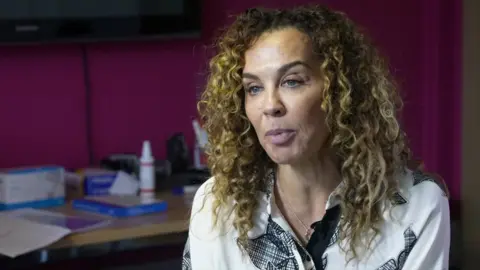Social care: Plans to fund improvement in England unveiled
 Getty Images
Getty ImagesThe government has promised more help for disabled people to adapt their homes, under plans to improve social care services in England.
A policy paper says additional support, alongside a new service for small repairs, will help people receive care in their own home for longer.
More investment in technologies such as motion alarms has also been promised.
Labour said the plans "fall woefully short of the mark" and would not solve an immediate crisis in the sector.
The proposals have been detailed in a new long-term strategy paper for improving care services over the next decade.
They will be paid for using money from a planned increase to National Insurance (NI), a tax paid by working people, from next April.
The government says the tax rise is expected to raise £12bn a year, which will go initially towards easing pressure on the NHS.
In October, it confirmed it plans to spend £5.4bn on social care over the next three years, with £1.7bn earmarked for improving services.
The remaining £3.6bn will fund a more generous means test for receiving local council support, and a new £86,000 lifetime cap on care fees.
The cap will cover fees for personal care, like help with washing and dressing. It will not cover living costs such as care home fees, food or utility bills.
In its paper published on Wednesday, it detailed plans to spend just under £1bn of this £1.7bn amount on services, including:
- £300m for supported housing, where accommodation is provided alongside care support
- £150m to invest in new technologies, such as personal alarm systems and online rotas for staff
- £500m will be put towards improving training and qualifications for staff
- £5m to find new ways to inform people about how they can access available support
The government has also said it will allow disabled people to claim bigger payments from their local authority for home adaptations.
This will be delivered by increasing the current £30,000 upper limit of an existing scheme, called the Disabled Facilities Grant.
The grants can be put towards the cost of changes such as installing stairlifts, wetrooms and home technologies.
Ministers say they will also consult next year on changing the financial means-test that allows people to qualify for payments.
They also say they will launch a separate "practical support service" to help people with more minor repairs to their homes.


There was a lot of hope riding on Wednesday's announcement of government plans for adult social care.
In a care system that has been in crisis for a long time, people wanted a clear vision for the future.
The care minister said she was setting out an ambitious 10-year plan, on an issue that other governments had ducked for too long.
The aim to provide outstanding personalised care which is fair and accessible will be welcomed, but for many in the care sector the actual details of what is proposed are disappointing.
They argue they do nothing to fix the acute problems they face now.
They had hoped much more would be done to attract care workers, as care providers are struggling to recruit enough staff.
Council officials had asked for extra funding over winter because an estimated 400,000 people in England are either waiting for services, or waiting to be assessed.
The paper provides a future vision, but it doesn't deal with the immediate bumps in the road ahead.

Unveiling the plans in the Commons, Health Minister Gillian Keegan said they would give people more choice and support to lead "independent lives".
She added that successive governments had ducked the challenges posed by the sector, but ministers were now "determined to get it right".
But shadow social care minister Liz Kendall said the paper lacked a "long-term strategy" to improve carers' pay and conditions, or recruit additional people into the sector to meet growing demand.
She told MPs that the document would not help clear waiting lists for those waiting to get care support from their local council.
"Hundreds of thousands of older and disabled people are being left without the vital support they need, piling even more pressure on their families and the NHS at the worst possible time," she added.

Recruitment struggles

Camille Leavold, who manages Abbots Care, says low pay and poor prospects for care workers mean she struggles to recruit and retain staff.
The company, which she co-founded, has 500 employees, who provide support to 1,000 people in their own homes.
She says that without additional funding to allow employers to boost salaries, a lack of availability of homecare will only worsen.
She also wants social care professionalised, with all care workers on a professional register, "in the same way nursing was professionalised".

The Local Government Association said the ambitions in the paper should be balanced against the "wider reality of the funding backdrop" for local authorities in England, which it represents.
Tory councillor David Fothergill, who chairs the LGA's community wellbeing board, said funding was "insufficient to meet current and rising demand".
"While councils share the government's ambition and want nothing more than to deliver it, they will need a substantially bigger share of the new health and social care levy for that to happen," he added.
Caroline Abrahams, charity director of Age UK, said a lack of investment meant changes to the sector would be modest and slow.
She added: "Rather than the Formula One vehicle that was required, the paper is an underpowered saloon car at best."
